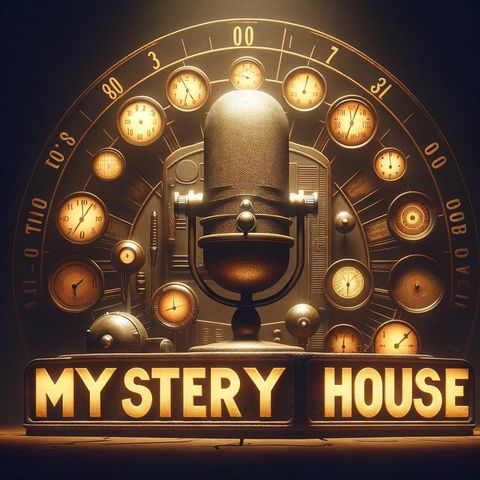
Contactos
Información
"Mystery House" refers to an intriguing and somewhat obscure part of early broadcasting history, tied to the concept of a radio drama series that was purportedly connected to a real...
mostra másBackground and Concept
- Origin: The show reportedly began airing in 1929, positioning it within the Golden Age of Radio, a period when radio was a dominant form of entertainment in the United States.
- Premise: The unique selling point of "Mystery House" was its method of vetting potential novels. According to the lore, every new novel was acted out by the staff of the Mystery House publishing firm, owned by Dan and Barbara Glenn, before being accepted for publication. This concept not only served as a creative method for story selection but also provided a dynamic way to engage with audiences.
- Broadcast History: It is said to have had a rather extended, though not continuous, broadcast life, lasting until as late as 1951. This span covers significant events and changes in society and technology, from the Great Depression through World War II and into the early Cold War era.
- Existence of the Glenns and the Publishing Firm: There is scant information on the actual existence of Dan and Barbara Glenn or the Mystery House publishing company. It's unclear whether they were fabricated as part of the show's lore or were real individuals using the radio series as an innovative marketing tool.
- Surviving Episodes: Like many early radio programs, the surviving episodes of "Mystery House" are rare. Those that do exist offer a fascinating glimpse into the show's approach to storytelling and its place in radio history.
- Entertainment Value: Despite the scarcity of episodes and concrete information, what remains of "Mystery House" is considered quite entertaining, especially for enthusiasts of vintage radio dramas and early media experimentation.
While "Mystery House" might not be as well-known as other radio dramas of its time, its concept was ahead of its time, anticipating later trends in interactive and immersive storytelling. The idea of "acting out" novels before publication as a form of vetting and audience engagement is a precursor to modern multimedia storytelling techniques, including visual novels, interactive theater, and certain forms of live-action role-playing games.In summary, "Mystery House" represents a fascinating footnote in the history of broadcasting and publishing, blending creativity and mystery both in its content and its history. The lack of comprehensive records adds to its allure, inviting speculation and research into this unique intersection of radio drama and literature.

"Mystery House" refers to an intriguing and somewhat obscure part of early broadcasting history, tied to the concept of a radio drama series that was purportedly connected to a real...
mostra másBackground and Concept
- Origin: The show reportedly began airing in 1929, positioning it within the Golden Age of Radio, a period when radio was a dominant form of entertainment in the United States.
- Premise: The unique selling point of "Mystery House" was its method of vetting potential novels. According to the lore, every new novel was acted out by the staff of the Mystery House publishing firm, owned by Dan and Barbara Glenn, before being accepted for publication. This concept not only served as a creative method for story selection but also provided a dynamic way to engage with audiences.
- Broadcast History: It is said to have had a rather extended, though not continuous, broadcast life, lasting until as late as 1951. This span covers significant events and changes in society and technology, from the Great Depression through World War II and into the early Cold War era.
- Existence of the Glenns and the Publishing Firm: There is scant information on the actual existence of Dan and Barbara Glenn or the Mystery House publishing company. It's unclear whether they were fabricated as part of the show's lore or were real individuals using the radio series as an innovative marketing tool.
- Surviving Episodes: Like many early radio programs, the surviving episodes of "Mystery House" are rare. Those that do exist offer a fascinating glimpse into the show's approach to storytelling and its place in radio history.
- Entertainment Value: Despite the scarcity of episodes and concrete information, what remains of "Mystery House" is considered quite entertaining, especially for enthusiasts of vintage radio dramas and early media experimentation.
While "Mystery House" might not be as well-known as other radio dramas of its time, its concept was ahead of its time, anticipating later trends in interactive and immersive storytelling. The idea of "acting out" novels before publication as a form of vetting and audience engagement is a precursor to modern multimedia storytelling techniques, including visual novels, interactive theater, and certain forms of live-action role-playing games.In summary, "Mystery House" represents a fascinating footnote in the history of broadcasting and publishing, blending creativity and mystery both in its content and its history. The lack of comprehensive records adds to its allure, inviting speculation and research into this unique intersection of radio drama and literature.
Información
| Autor | QP-2 |
| Organización | William Corbin |
| Categorías | Artes escénicas |
| Página web | - |
| corboo@mac.com |
Copyright 2024 - Spreaker Inc. an iHeartMedia Company
